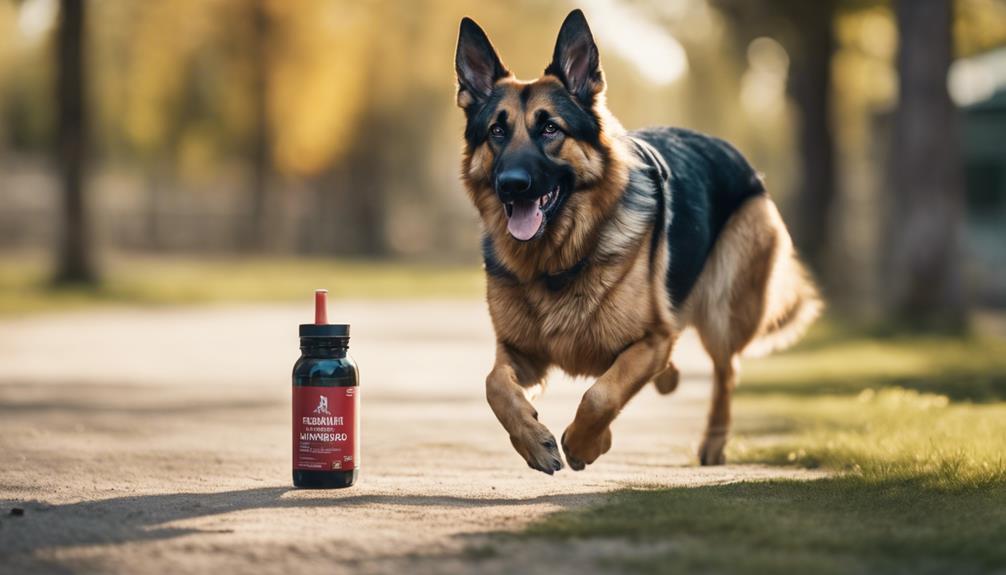🐾 Paw-some Partnership Alert! 🐾
As a pack of German Shepherd enthusiasts at MixGermanShepherd.com, we're always sniffing out the best products for our furry friends. Guess what? When you fetch something from Amazon through our links, we earn a little treat! 🦴
Have you ever wondered how genetics impact the joint health of German Shepherd mixes? Understanding the unique needs and potential challenges faced by these dogs can significantly contribute to their overall well-being. By exploring tailored strategies and expert advice in managing joint health for German Shepherd mixes, you can ensure a fulfilling and active life for your furry companion.
Key Takeaways
- Optimal joint health in German Shepherd mixes is crucial for their overall well-being and longevity.
- Early detection of joint issues like hip dysplasia, arthritis, and stiffness is essential for timely intervention.
- Incorporating low-impact exercises and recommended joint supplements can help manage and improve joint health.
- Weight management, balanced nutrition, and regular vet check-ups are vital for maintaining healthy joints in German Shepherd mixes.
Importance of Joint Health

Maintaining optimal joint health is paramount for the overall well-being and longevity of German Shepherd mixes. These breeds are predisposed to joint issues such as hip dysplasia and arthritis. To address this, German Shepherds need proper care, including the use of supplements like glucosamine and Omega-3 fatty acids. Glucosamine aids in cartilage formation and repair, while Omega-3 fatty acids reduce inflammation in the joints, promoting overall joint health.
Common Joint Issues in German Shepherds

To address the prevalent joint issues in German Shepherds, it is crucial to understand the specific challenges they face, such as hip dysplasia and elbow dysplasia, which significantly impact their mobility and comfort. German Shepherds commonly suffer from joint problems like hip dysplasia, elbow dysplasia, and arthritis, which can hinder their quality of life. Around 19% of German Shepherds are affected by hip dysplasia, while elbow dysplasia is another prevalent issue that impacts their ability to move comfortably. Arthritis, a degenerative joint disease, can affect up to 30% of these dogs, leading to pain and reduced mobility. With approximately 70% of German Shepherds over 8 years old experiencing some form of joint problem, it underscores the importance of proactive joint health management. Regular veterinary check-ups and proactive measures are vital in detecting and addressing joint issues early in German Shepherds to maintain their mobility and overall well-being.
- Hip dysplasia affects around 19% of German Shepherds
- Elbow dysplasia is a prevalent joint issue impacting mobility
- Arthritis can affect up to 30% of German Shepherds
- Approximately 70% of German Shepherds over 8 years old have joint problems
- Proactive joint health management is essential for maintaining mobility
Early Signs of Joint Problems

Early signs of joint problems in German Shepherd mixes can manifest through subtle changes in their mobility and behavior, alerting owners to potential underlying issues that require veterinary attention. Watch for signs like limping, stiffness, reluctance to move, or difficulty getting up. These could indicate early joint problems in your German Shepherd mix. Additionally, changes in gait, trouble with stairs, or decreased activity may be early indicators of joint issues. Keep an eye out for swelling, warmth, or tenderness around joints as these could signal underlying joint problems that need addressing. Monitoring your dog for changes in behavior such as irritability, decreased appetite, or withdrawal from activities is crucial in detecting joint issues early. If you notice any of these signs, it is essential to consult a veterinarian promptly. Early detection and intervention play a vital role in managing joint health in German Shepherd mixes.
Exercise Guidelines for Joint Health

Controlled and appropriate exercise plays a crucial role in supporting joint health in German Shepherd mixes, especially in preventing potential issues as they age. When considering the exercise regimen for your German Shepherd mix, here are some guidelines to promote optimal joint health:
- Gradually Increase Activity Levels: Start with low-impact exercises like short walks and slowly increase intensity to build strength.
- Incorporate Low-Impact Exercises: Choose activities like swimming or gentle play to reduce stress on the joints.
- Avoid High-Impact Activities: Steer clear of activities that involve jumping or running on hard surfaces to prevent joint strain.
- Consult a Vet: Seek professional advice to tailor an exercise plan specific to your German Shepherd mix's needs.
- Receive Personalized Exercise Recommendations: Vets can provide guidance on the duration, frequency, and type of exercises that best suit your dog's joint health requirements.
Recommended Joint Supplements

Joint supplements rich in glucosamine, chondroitin, and Omega-3s are recommended to support the overall joint health of German Shepherd mixes. These supplements play a crucial role in reducing inflammation, alleviating pain, and improving mobility in your furry companion. Glucosamine helps in the formation of cartilage, which cushions the joints, while chondroitin is essential for cartilage elasticity and strength. Omega-3 fatty acids aid in reducing inflammation and promoting overall joint health. When choosing joint supplements for your German Shepherd mix, it is advisable to consult a veterinarian for personalized recommendations based on your pet's specific needs. Each dog may respond differently to supplements, and a professional can guide you towards the most effective options. By incorporating these supplements into your dog's daily routine, you can significantly enhance their quality of life and ensure they remain active and comfortable as they age.
Benefits of Glucosamine

Glucosamine plays a vital role in supporting cartilage and joint mobility in German Shepherd mixes. It is a key component in aiding joint health and can provide several benefits when included in your dog's daily routine. Here are some important points to consider when it comes to the benefits of glucosamine supplements for dogs:
- Glucosamine can help reduce inflammation, making it a valuable tool in managing conditions like osteoarthritis.
- The supplement supports cartilage, which is essential for maintaining healthy joints in German Shepherd mixes.
- Consulting your vet is crucial to ensure you choose the right glucosamine supplement and determine the correct dosage for your dog's specific needs.
- Monitoring your dog's response to glucosamine is essential to assess its effectiveness and adjust the dosage if needed.
- Starting glucosamine supplementation early can contribute significantly to the long-term joint health of your German Shepherd mix. Remember, early supplementation can make a difference in maintaining your dog's mobility and quality of life.
Role of Omega-3 Fatty Acids

Omega-3 fatty acids, particularly sourced from fish oil, play a crucial role in promoting joint health and mobility in German Shepherd mixes. These essential fatty acids have been shown to reduce inflammation within the joints, which is beneficial for managing joint issues in these dogs. Research indicates that Omega-3 fatty acids can improve joint mobility, reduce stiffness, and support overall joint health by aiding in cartilage maintenance and joint lubrication. By including fish oil rich in Omega-3s in the diet of German Shepherd mixes, you can help alleviate joint pain and discomfort they may experience. Supplementing with Omega-3 fatty acids is a proactive approach to supporting your dog's joint health, ensuring they can move comfortably and stay active. Consider adding this vital nutrient to your German Shepherd mix's diet to promote their joint well-being and overall quality of life.
Understanding Hip Dysplasia

In German Shepherd mixes, a common genetic condition known as hip dysplasia affects the formation of the hip socket, resulting in joint instability. This condition can significantly impact the overall quality of life for your furry friend. Here are some key points to understand about hip dysplasia:
- Symptoms: Watch out for signs like lameness, difficulty rising, and decreased range of motion in your dog.
- Arthritis: If left untreated, hip dysplasia can progress to arthritis, causing further discomfort.
- Joint Supplements: Incorporating joint supplements into your dog's diet can help support joint health and mobility.
- Weight Management: Maintaining a healthy weight is crucial in managing hip dysplasia and reducing strain on the joints.
- Quality of Life: Proper management of hip dysplasia can greatly improve your dog's overall quality of life and keep them active and happy for longer.
Preventing Joint Issues

To prevent joint issues in your German Shepherd mix, focus on incorporating exercises that promote joint health, such as controlled walks and swimming. Ensure your dog receives balanced nutrition to support their joint health, including supplements like glucosamine and chondroitin. Regular vet check-ups are essential for monitoring your dog's joint health and catching any issues early on.
Exercise for Joint Health
How can proper exercise routines contribute to preventing joint issues in German Shepherd mixes? When it comes to maintaining joint health in German Shepherd mixes, incorporating the right exercise routines is crucial. Here are some key points to consider:
- Engage in gradual physical activity to prevent joint strain.
- Choose low-impact exercises such as walking or swimming to protect joints.
- Focus on building muscle strength to support joint stability.
- Avoid high-impact activities that could potentially damage the joints.
- Consistent, moderate exercise plays a vital role in preserving joint health over time.
Balanced Nutrition Importance
What role does balanced nutrition play in preventing joint issues in German Shepherd mixes? Balanced nutrition is essential for the proper development and maintenance of joint health in German Shepherd mixes. Providing the right combination of protein, calcium, vitamins, and minerals through a proper diet is crucial for supporting healthy joints. Controlling the growth rate and maintaining an optimal weight through balanced nutrition can help reduce strain on developing joints, ultimately preventing potential joint issues. Opting for high-quality, large breed puppy food specifically formulated for the needs of German Shepherds is recommended. It is important to avoid over-supplementation and focus on a well-rounded, balanced diet to ensure the long-term joint health of your German Shepherd mix.
| Nutrient | Importance |
|---|---|
| Protein | Supports muscle development |
| Calcium | Aids in bone strength |
| Vitamins and Minerals | Essential for overall health |
| Proper Diet | Controls growth rate and weight |
Regular Vet Check-Ups
Regular vet check-ups play a crucial role in monitoring joint health and preventing potential issues in German Shepherd mixes.
- Veterinarians can provide valuable guidance on maintaining joint health through preventive measures.
- Routine check-ups allow early detection of joint problems, leading to better quality of life for German Shepherd mixes.
- Vets can recommend suitable exercises, diets, and supplements to support joint health in mixed breed dogs.
- Consistent veterinary care can help ensure that joint issues are managed effectively and proactively in German Shepherd mixes.
Managing Weight for Joint Health

Maintaining an optimal weight is essential for the joint health of German Shepherd mixes. Excess weight puts added stress on their joints, increasing the risk of early joint problems. Monitoring calorie intake and incorporating regular exercise are key components in managing weight to promote joint health.
Weight and Joint Health
Proper weight management plays a vital role in safeguarding the joint health of German Shepherd mixes. Excess weight can strain their joints, increasing the risk of joint problems. To maintain optimal joint health, consider the following:
- Balanced Diet: Provide your German Shepherd mix with a well-balanced diet to support weight management.
- Regular Exercise: Engage your dog in routine exercise to help them maintain a healthy weight and strengthen their joints.
- Prevention of Joint Issues: Proper weight management can prevent potential joint problems in the future.
- Improved Mobility: Maintaining a healthy weight can enhance your dog's overall mobility and quality of life.
- Consultation: Seek personalized advice from a veterinarian for tailored weight management strategies for your German Shepherd mix.
Dietary Tips for Joints
To optimize joint health in German Shepherd mixes, focus on implementing dietary strategies that promote weight management and reduce stress on their joints. Maintaining a healthy weight is crucial as excess weight puts strain on joints, increasing the risk of joint problems. Proper diet control can prevent obesity and decrease stress on their joints. It is essential to consult a vet for personalized dietary recommendations tailored to your dog's specific needs. Monitoring food intake and providing regular exercise are also vital components in supporting joint health in German Shepherd mixes. By managing weight through diet and exercise, you can help your furry companion maintain healthy joints and overall well-being.
Implementing Joint Supplements

When implementing joint supplements for your German Shepherd mix, consult with a veterinarian for tailored recommendations on the most suitable type and optimal dosage. Joint supplements containing ingredients like glucosamine and chondroitin play a significant role in supporting cartilage health, reducing inflammation, and enhancing joint mobility for German Shepherd mixes. To ensure the effectiveness of the supplements, personalized recommendations from a vet are essential. Here are five key points to consider when implementing joint supplements for your furry companion:
- Vet Consultation: Always seek advice from a veterinarian before starting any joint supplement regimen.
- Quality Matters: Opt for high-quality supplements to ensure maximum benefits for your German Shepherd mix.
- Consistent Dosage: Follow the recommended dosage consistently to maintain the desired effects.
- Monitor Progress: Keep track of your dog's response to the supplements and adjust as needed.
- Combination Formulas: Consider supplements that combine glucosamine and chondroitin for synergistic effects on joint health.
These steps will assist you in effectively managing your German Shepherd mix's joint health.
Monitoring Joint Health Progress
Regularly schedule vet check-ups for your German Shepherd mix to assess joint health progress objectively. Tailor exercise routines to suit your dog's specific needs, ensuring optimal joint function. Document any changes in mobility, discomfort, or stiffness meticulously to detect potential joint issues early on.
Regular Vet Check-Ups
Monitoring joint health progress in German Shepherd mixes can be effectively achieved through regular vet check-ups. By scheduling routine visits, you can ensure the well-being of your furry companion's joints. Here are some key points to consider:
- Early detection of joint issues
- Guidance on preventative measures
- Adjustments to diet, exercise, and supplementation
- Ensuring optimal joint health
- Tracking progress for improved mobility
Regular vet check-ups play a crucial role in maintaining the joint health of German Shepherd mixes. These visits allow for proactive interventions and personalized care to address any concerns promptly, ultimately enhancing the overall quality of life for your pet.
Exercise Routines Tailored
To effectively monitor the progress of your German Shepherd mix's joint health, tailor their exercise routines to suit their individual needs and limitations. Observe your dog's movement during physical activities and be alert to any signs of discomfort or stiffness. Adjust the intensity and duration of exercises gradually, paying close attention to how your German Shepherd mix responds to prevent joint strain. It's crucial to monitor your dog's joint health throughout the exercise regimen, ensuring that any adjustments are made promptly to avoid potential issues. Consulting with a veterinarian or professional trainer can provide valuable guidance in designing a safe and effective exercise plan tailored to your German Shepherd mix's joint health needs.
Expert Tips for Joint Care

When caring for the joints of your German Shepherd mix, it is crucial to prioritize regular exercise and weight management for optimal health. Here are expert tips to help you ensure the well-being of your furry friend's joints:
- Regular Exercise: Engage your German Shepherd mix in low-impact activities like walking or swimming to keep their joints moving without excessive strain.
- Weight Management: Maintain a healthy weight for your dog to reduce stress on their joints and minimize the risk of joint issues.
- Joint Supplements: Consider incorporating glucosamine and chondroitin supplements into your dog's diet to support joint health and reduce inflammation.
- Vet Consultation: Consult a veterinarian to get personalized recommendations on joint care tailored to your German Shepherd mix's specific needs.
- Monitoring: Keep a close eye on your dog's joint health, observing any changes in mobility or signs of discomfort to address potential issues promptly.
Frequently Asked Questions
How Do You Prevent Joint Problems in German Shepherds?
To prevent joint problems in German Shepherds, you should focus on exercise routines, weight management, dietary changes, regular check-ups, physical therapy, joint-friendly activities, proper hydration, and muscle strengthening. Consult with your vet for tailored advice and guidance.
Should German Shepherds Take Joint Supplements?
You should consider joint supplements for your German Shepherd. These supplements can provide various benefits like reducing pain and inflammation. Consult your vet to select the best supplements. Remember, your furry friend's joint health is vital!
How Do You Take Care of a German Shepherd Joint?
To take care of a German Shepherd's joints, focus on exercise routines that suit age and breed, adjust their diet for joint health, manage weight, engage in joint-friendly activities, get regular check-ups, ensure proper rest, consider physical therapy, and explore natural remedies.
How Do I Keep My German Shepherds Hips Healthy?
To keep your German Shepherd's hips healthy, focus on a balanced diet, weight control, and regular exercise. Incorporate joint-friendly activities, supplements like glucosamine, and vet check-ups. Think of your dog's hips as the foundation of their mobility – care for it wisely.
Conclusion
In conclusion, managing joint health in German Shepherd mixes is crucial for their overall well-being. By monitoring their growth, providing a balanced diet, incorporating appropriate exercise routines, and consulting with a veterinarian for supplements, you can help prevent and manage common joint issues like hip dysplasia and arthritis. Remember, proactive care and early intervention are key to ensuring your German Shepherd mix stays healthy and active for years to come. Stay vigilant and committed to their joint health for a happy and mobile companion.
